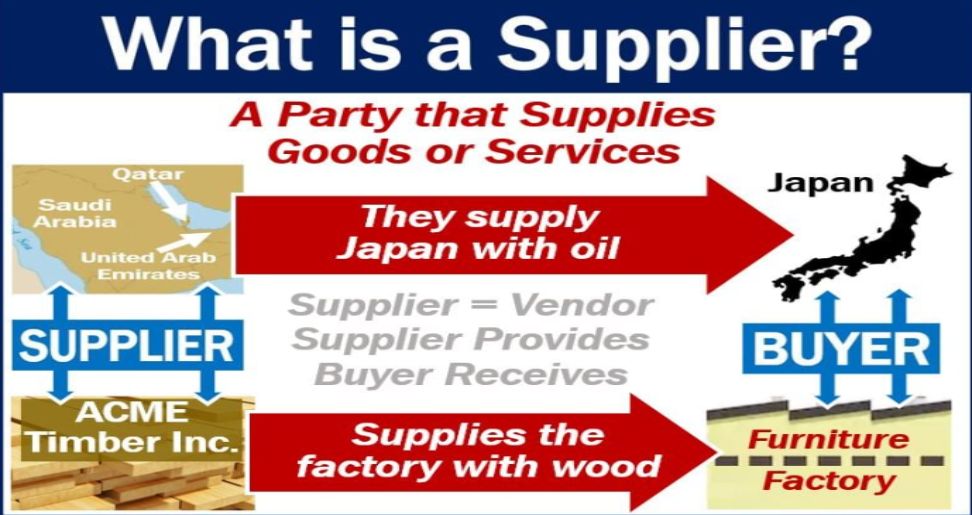A supplier is a person or entity that provides goods or services to another entity.
They are a crucial component of the supply chain.
Trade – suppliers and buyers

Trade is the fundamental economic activity involving the exchange of goods and services between two or more parties.
Central to this exchange are suppliers and buyers. Suppliers are entities, ranging from individuals to corporations, that offer products or services to meet the needs of others. They play a crucial role in the production and distribution chain, ensuring the availability of essential goods and services. On the other hand, buyers are the entities seeking to acquire these offerings to satisfy their consumption or production requirements. This dynamic relationship between suppliers and buyers drives economic growth, fosters innovation, and contributes to the overall well-being of societies. Effective trade necessitates a balance of interests, where suppliers aim to maximize profits while meeting buyer demands, and buyers strive to obtain quality products or services at competitive prices.
Supplier – a country
A supplier nation is a country that primarily exports goods or services to other countries. It often possesses abundant natural resources, a skilled workforce, or advanced manufacturing capabilities that enable it to produce goods at competitive prices. These nations play a crucial role in global trade, contributing significantly to the economic growth of both the supplier and the importing countries. Factors influencing a country’s status as a supplier include government policies, infrastructure development, technological advancements, and labor costs.
Supplier in supply chain management

Suppliers are integral to the functioning of a supply chain. They provide the essential raw materials, components, or finished goods that are transformed or assembled into final products. As the initial link in the chain, suppliers significantly influence overall supply chain performance. Their reliability, efficiency, and quality directly impact production schedules, inventory levels, and customer satisfaction. Effective supply chain management involves cultivating strong relationships with suppliers, ensuring timely deliveries, maintaining consistent quality standards, and managing potential risks. By strategically selecting and collaborating with suppliers, organizations can optimize costs, enhance product quality, and achieve greater supply chain resilience.
Supplier – example
A supplier is a person or entity that provides goods or services to another party. For instance, a car manufacturer relies on suppliers for components like engines, tires, and glass. In the realm of technology, a software company might procure cloud services from a supplier like Amazon Web Services. Essentially, a supplier is a crucial link in the supply chain, contributing essential inputs that enable the creation of final products or services.
Types of Suppliers

Raw Material Suppliers
Raw material suppliers are the cornerstone of the manufacturing industry, providing the essential components needed for production processes. These businesses procure, store, and distribute a vast array of materials, ranging from basic commodities like metals, minerals, and agricultural products to specialized substances employed in advanced technologies. Their role is critical in maintaining uninterrupted production cycles, ensuring consistent product quality, and facilitating cost-effective operations. Effective partnerships with reliable raw material suppliers are vital for businesses to achieve their production targets and maintain a competitive edge in the market.
Component Suppliers
Component Suppliers are critical links in the manufacturing supply chain, providing essential parts and materials to produce finished goods. These businesses specialize in sourcing, procuring, and distributing a diverse range of components, from raw materials to complex subassemblies. They operate across various industries, including electronics, automotive, aerospace, and manufacturing, ensuring a steady flow of components to meet production demands. Effective component suppliers possess deep industry knowledge, robust supply chain management capabilities, and strong relationships with manufacturers and distributors to guarantee product quality, delivery reliability, and cost-efficiency.
Service Suppliers
Service Suppliers are entities, whether individuals or organizations, that provide specific services to clients or customers. Unlike product-based businesses, service suppliers offer intangible offerings such as expertise, labor, or utilities. These services can range from professional consulting and IT support to maintenance, transportation, and hospitality. The core value proposition of a service supplier lies in their ability to effectively address client needs through specialized knowledge and resources, often tailored to individual requirements.
Wholesale Suppliers
Wholesale suppliers are the linchpins of the supply chain, acting as intermediaries between manufacturers and retailers. They purchase products in bulk directly from producers, often securing significant discounts due to the large quantities involved. This enables wholesalers to offer competitive prices to retailers while maintaining their own profit margins. Beyond cost-efficiency, wholesalers provide essential services such as warehousing, inventory management, and transportation, streamlining the distribution process for manufacturers and retailers alike. They also play a crucial role in market analysis, identifying product trends and consumer demands, which helps both producers and retailers make informed business decisions. In essence, wholesalers optimize the flow of goods, reduce costs, and contribute to the overall efficiency of the supply chain.
Examples Across Industries
To better understand the concept, let’s explore examples of suppliers in different industries:
- Food Industry: Farmers, packaging material suppliers, food processing equipment manufacturers, transportation companies.
- Electronics Industry: Semiconductor manufacturers, display panel suppliers, battery producers, assembly line equipment providers.
- Automotive Industry: Steel manufacturers, glass suppliers, engine component manufacturers, paint suppliers.
- Fashion Industry: Textile manufacturers, fabric suppliers, button and zipper manufacturers, dyeing and finishing services.
- Technology Industry: Software developers, hardware component suppliers, cloud service providers, data center operators.
Supplier Relationships
The relationship between a company and its suppliers is crucial for business success. Effective supplier management involves:
Supplier Selection: Carefully choosing suppliers based on quality, cost, reliability, and ethical standards.
Supplier Development: Collaborating with suppliers to improve performance and reduce costs.
Supplier Relationship Management: Supplier Relationship Management (SRM) is a strategic approach to optimizing the value derived from an organization’s supply chain.
It involves systematically evaluating and partnering with vendors providing goods or services, assessing their contributions to overall success, and developing strategies to enhance their performance. By fostering strong, collaborative relationships with key suppliers, businesses can unlock cost savings, improve operational efficiency, mitigate risks, and drive innovation. SRM encompasses various activities, including supplier selection, performance evaluation, contract management, and communication. Ultimately, effective SRM aligns supplier capabilities with organizational goals, creating a mutually beneficial partnership that delivers sustainable competitive advantage.
Specific Examples
To illustrate further, let’s consider specific examples of suppliers within particular industries:
- Restaurant: Food distributors, beverage suppliers, kitchen equipment providers, cleaning service providers.
- Software Development Company: Cloud service providers, hardware suppliers, software licensing companies, IT support services.
- Manufacturing Plant: Machinery suppliers, energy providers, packaging material suppliers, waste management services.
- Event Planning Company: Floral suppliers, catering services, venue providers, audio-visual equipment rental companies.
Supplier Categories Beyond Traditional

In addition to the traditional understanding of suppliers as providers of goods or services, the term can also encompass:
- Knowledge Suppliers: Consultants, research firms, data analytics providers.
- Financial Suppliers: Banks, investment firms, insurance companies.
- Human Resources Suppliers: Recruitment agencies, training providers, payroll services.
Supplier Roles in the Supply Chain
It’s important to note that the role of a supplier can vary within a supply chain. For instance:
- Tier 1 Supplier: Directly supplies to the end product manufacturer.
- Tier 2 Supplier: Supplies to a Tier 1 supplier.
- Tier 3 Supplier: Supplies to a Tier 2 supplier, and so on.
Understanding these different tiers is crucial for effective supply chain management.
Conclusion
Suppliers form the backbone of any business, providing the essential components, services, or resources needed for operations. From raw materials to specialized expertise, suppliers play a pivotal role in determining a company’s success. Effective supplier management, including careful selection, development, and relationship building, is crucial for optimizing supply chains and achieving business objectives. By understanding the diverse range of suppliers across industries and their varying roles within the supply chain, organizations can enhance their procurement strategies and foster long-term partnerships.
Read More :
Featured Image Source: https://tinyurl.com/2hzbhxxy

